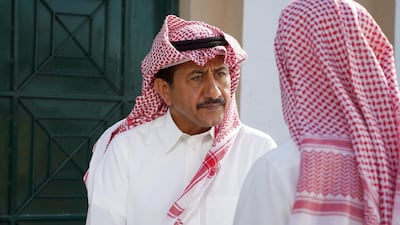With television ratings a closely guarded secret in the region, the best barometer of a Ramadan drama's reception is social media.
On that score, MBC's Al Assouf is a hit. Since premiering during Ramadan last year, the historical drama has been praised for bringing to our screens a different side of Saudi Arabia. It is one far removed from the shiny metropolises of today and more to do with simpler times, before the oil boom when family life was at the centre of society.
A more complex 'Al Qasabi'
That contrast also extends to its leading man. For more than two decades, Saudi Arabian actor Nasser Al Qasabi has been entertaining the region with hit television comedies Tash Ma Tash and Selfie, which are full of his brilliant dry humour. Where those works were always laced with social commentary, in Al Assouf, he abandoned his trademark witty ripostes for the more sombre role of Khalid, the eldest son of the Al Tayan family.
While the second season has his character manoeuvring through the complex relationships of his family, Al Qasabi states the heart of the story is how Khalid and his fellow countrymen are coming to terms with a Saudi Arabia gradually moving away from its desert roots towards the regional powerhouse it is today. "We are observing the kingdom's state during that period, the beginning, end and changes that occurred," Al Qasabi says. "All this unfolded amid some of the most important events that took place during that era and left major effects on the kingdom and the world. This is really the essence of the work."
The show is based on the novel Boyoun Al Turb by Saudi Arabian author Abdul Rahman Al Askari, which is renowned for its historical sweep. Al Qasabi says adapting that expansive viewpoint into a pacey script proved to be challenging.
"It took us a long time to write down the script in order to come out with the final version we pictured, therefore, the episodes include fast-paced events, because this kind of work cannot be sluggish," he says. "Television series these days have become more important than movies, especially in the West. So why wouldn't we follow this industry that is fast-paced and has well-developed plots in order to have better results, which would please us and make us proud in front of our audience?"
Al Nasany proves the critics wrong
In order to achieve his goal, Al Qasabi enlisted frequent collaborator Abdullah Al Nasany. After appearing with Al Qasabi in a range of celebrated works, including the three-season run of the comedy Selfie, which ended in 2017, Al Nasany also had to dial down the humour in his role as the vindictive brother Muhsin.
"It was clear from the first season that he was very different from his other two siblings," he says. "In this second season, I explore that more and you see some of the reasons. He has psychological and financial challenges and on top of that, he is not able to produce children no matter how much he is trying. It's a very deep character and he is just trying to get by."
Al Nasany has relished the challenge. He is satisfied that his performance has caused some Saudi critics to reassess their view of the actor. "I went from comedy to this really dark character and I am proud of that," he says. "Moving forward, I want to do different types roles all the time. I don't want to be in a position where I am repeating myself."
This is not a history lesson
In addition to the mostly positive response on the Twittersphere, the series also received criticism for some of the antics of its characters. With Saudi Arabia regarded as a conservative and tightly knit society in the 1970s, critics took to social media to state that some of the issues the Al Tayan family face in the show are not consistent with life and the values of that era.
Al Qasabi responded to these online attacks in a recent episode of the popular Saudi Arabian talk show, Majomooat Ensan. "This show is not about me saying: 'This is how life was back in the day.' I am not giving a history lesson on how our parents were living and how great they are," he says. "I am happy that this show has provoked some people because that's the way that it is supposed to be. Drama is not about history, but about telling a story."
Al Assouf is on every day during Ramadan at 9.30pm on MBC1. For further details, visit www.mbc.net


